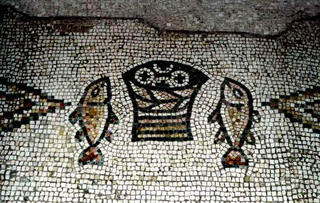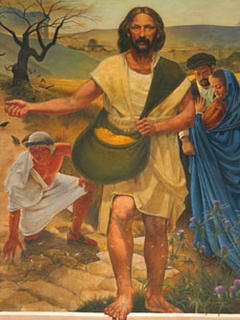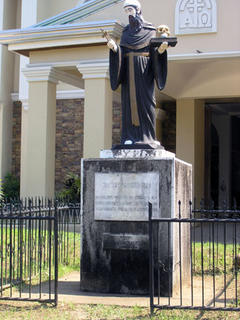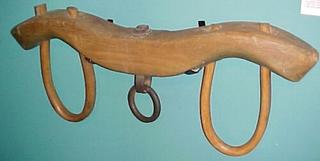MULTIPLICATION OF FIVE LOAVES AND TWO FISH
Christians of the early Byzantine period built monasteries, churches and shrines in Galilee and on the shores of the Sea of Galilee to commemorate the ministry of Jesus and the miracles ascribed to him. Tabgha – an Arabic corruption of the Greek name Heptapegon (Seven Springs) – is the traditional site of the Miracle of the Multiplication of the Loaves and the Fishes (Matt 14: 13-21). It is situated in a narrow, fertile valley on the northern shore of the lake, watered by several springs.
The Byzantine mosaic above was found in the ruins of the basilica, now restored.
(Jewish Virtual Library)
COMMENTARYNew American Bible
The taking, saying the blessing, breaking, and giving to the disciples correspond to the actions of Jesus over the bread at the Last Supper (Matthew 26:26). Since they were usual at any Jewish meal, that correspondence does not necessarily indicate a eucharistic reference here. Matthew's silence about Jesus' dividing the fish among the people (Mark 6:41) is perhaps more significant in that regard.
The fragments left over: as in Elisha's miracle, food was left over after all had been fed. The word fragments (Greek klasmata) is used, in the singular, of the broken bread of the Eucharist in Didache 9:3-4.
William Barclay
He says that you may explain the miracle in three ways:
First, it really was a miracle which meant the suspension of the laws of nature.
Second, it was a sacramental experience. The people received a morsel of food but through which they experienced spiritual strengthening.
Third, Jesus by sharing the bread he received inspired others to do the same, that is, to share the bread which they were keeping only for themselves.
DON BOSCODo miracles similar to this happen?
We read in the life of Don Bosco (St. John Bosco) several instances of him multiplying not only bread but chestnuts and even Eucharistic bread.
A boy at the Oratory had decided to leave the boarding school and return home. That morning at breakfast he noticed that the bread delivered was not enough for everyone. He saw Don Bosco take the basket and begin distributing bread. To his amazement there was bread enough for all. When his mother arrived to take him home, he changed his mind. He later became a Salesian.
SAYING GRACE
 Jewish Sabbath
Jewish SabbathHamotzi or blessing over the bread: Beginning with the father each person in turn repeats the blessing over the challah (bread): "Blessed art Thou, O Lord our God, King of the universe, who brings forth bread from the earth."
Christian Grace before meals
"Bless us, O Lord, and these your gifts which we are about to receive from your bounty through Christ, our Lord. Amen."
The Gospel says that before the bread was distributed for the eating, Jesus first said the blessing. To me saying grace before eating is a recognition of God's providence. God is good to me. The food that I eat comes from his goodness and I thank him for that.
In the life of St. Dominic Savio (He was barely fifteen when he died. He was a teenage saint, almost fifteen when he died.) we read that when he was a young boy, a man came to eat with them. But the man did not say grace. He quietly left the table. When his parents asked him privately why he left, he said that he didn't want to eat in the company of a man who behaved like an animal. Animals do not say grace before meals.
Saying grace in public then becomes a public expression of our faith in the providence in God.

















